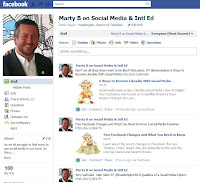In recent memory, there have been several shows in the children's television milieu that have been very disturbing to me, Barney & the Teletubbies come to mind. Thankfully, our first child didn't come along until after these fads had passed out of popular consciousness. But my nine-year old niece, Rachel, had her sights set on convincing my now 18-month old son, Charlie, about the inherent value of Sponge Bob Square Pants. Somebody had to put a stop to this madness!
While you're thinking how on earth can you tie social media & Mr. SquarePants together, rest assured I'll get there. About two weeks ago, while on my commuter bus ride home, I read a story on one of my news apps on my iPhone about a study that proclaimed Watching Sponge Bob is Bad For Kids. This was the evidence I needed to make my move. That night, I posted the following on Facebook, and see how the conversation unfolded:
While you're thinking how on earth can you tie social media & Mr. SquarePants together, rest assured I'll get there. About two weeks ago, while on my commuter bus ride home, I read a story on one of my news apps on my iPhone about a study that proclaimed Watching Sponge Bob is Bad For Kids. This was the evidence I needed to make my move. That night, I posted the following on Facebook, and see how the conversation unfolded:
Obviously, my last comment was only half serious. But a short two weeks later my sister-in-law confided that after she shared my post with my niece, and the accompanying news story about the effects of SBSP on kids, Rachel decided to give up on SpongeBob. Why? As a nine-year old, she is beginning to come to grips with herself as a student, and is incredibly self-aware. She stepped back to think about some issues she was having in school, thought about what the study was saying about attention issues, and realized that she did not need to watch SpongeBob any more. What a relief! My son is safe, at least for the moment. So what does this all mean? Other than Rachel having to get rid of a lot of SBSP clothing and toys (Christmas is coming, I hear her saying), I must say I'm very proud of her for making such a life-altering decision.
Moreover, this interaction demonstrates how social media can influence your intended audiences. As admissions reps know, guidance counselors and advisers say how important it is to have the "experts" speak to their students when we visit their schools and centers. In the end, we reinforce the messages that counselors/advisers have been hammering home for months, but, for whatever reason, our message has a greater impact because we're the "experts."
In social media land, while I firmly believe there are very few true experts, and even fewer (if any, myself included) who are successfully using social media in international education, our goal is to achieve the same things we have done in print, in person, and email recruiting in the past, but with different, yet more immediately impactful tools.
Other than this blog forum, I encourage you to join in a more regular conversation at Marty B on Social Media & Intl Ed Facebook page or if you prefer LinkedIn, a group of the same name.




No comments:
Post a Comment